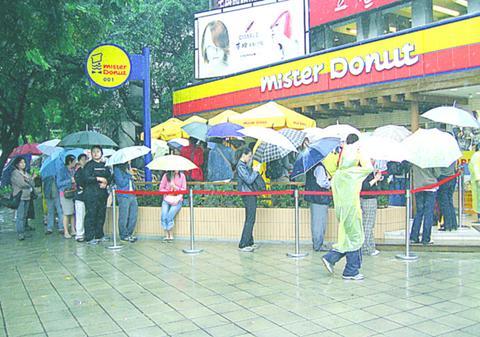Since it opened three weeks ago, Mister Donut has been called a gastronomic wonder and an eyesore, depending on the commentator's point of view.
A line begins to thread its way out of the store and onto the sidewalk long before the store has opened for business. Even though bright yellow signs inform would-be doughnuts eaters that their wait could last several hours the line never dissipataes. It just gets longer.

PHOTO: GAVIN PHIPPS, TAIPEI TIMES
On the advice of an associate at the office, we indulged in a slap-up meal before joining a snaking 90m line at exactly 12:19pm on Monday. With over 100 people already eagerly awaiting their chance to purchase sugary sustenance the wait was on.
The rain and wind dampened any camaraderie that may have developed between those standing in line and mobile-phone companies were racking in mega profits as giggly adolescent girls and bemused teenage boys passed the time informing their friends of their "fashionable" whereabouts.
When asked why on earth one would want to stand in the rain to purchase something as mundane as a doughnut, one bedraggled chap shrugged his shoulders and refused to comment. A 17-year-old girl chuckled and said "because my friends said [doughnuts] were good" while another youngster whose pronounced girth resembled a doughnut idiotically replied, "It's the new thing to do. Eat doughnuts. Yeah!"
After almost four-and-a-half hours and half-a-packet of smokes we finally crossed the threshold at 4:15pm, only to be greeted by a female employee who acted as if the entire queuing activity had been one big game.
The long-awaited sight of a cabinet filled with a colorful array of 30 varieties of glazed, jelly filled and cake doughnuts, was no compensation for our miserable four-hour ordeal. Shame, then, there were no double Valium doughnuts on offer.
Having purchased a mixed bag of 30 doughnuts brought the goods back to the office for ingestion and analysis. The final verdict? While praise for fortitude was unanimous the same cannot be said for the doughnuts themselves. Comments ranged from, "These aren't as good as Dunkin' Donuts" to "they're a bit chewy aren't they?" and "they'll do."
All of which adds up to two things: If you like so-so doughnuts, wait until the fashionable popularity of Mister Donut wanes. Do not, whatever you do, stand in line for hours outside any Mister Donut branch unless you want to go nuts long before you've eaten your doughnuts!

Towering high above Taiwan’s capital city at 508 meters, Taipei 101 dominates the skyline. The earthquake-proof skyscraper of steel and glass has captured the imagination of professional rock climber Alex Honnold for more than a decade. Tomorrow morning, he will climb it in his signature free solo style — without ropes or protective equipment. And Netflix will broadcast it — live. The event’s announcement has drawn both excitement and trepidation, as well as some concerns over the ethical implications of attempting such a high-risk endeavor on live broadcast. Many have questioned Honnold’s desire to continues his free-solo climbs now that he’s a

As Taiwan’s second most populous city, Taichung looms large in the electoral map. Taiwanese political commentators describe it — along with neighboring Changhua County — as Taiwan’s “swing states” (搖擺州), which is a curious direct borrowing from American election terminology. In the early post-Martial Law era, Taichung was referred to as a “desert of democracy” because while the Democratic Progressive Party (DPP) was winning elections in the north and south, Taichung remained staunchly loyal to the Chinese Nationalist Party (KMT). That changed over time, but in both Changhua and Taichung, the DPP still suffers from a “one-term curse,” with the

Jan. 26 to Feb. 1 Nearly 90 years after it was last recorded, the Basay language was taught in a classroom for the first time in September last year. Over the following three months, students learned its sounds along with the customs and folktales of the Ketagalan people, who once spoke it across northern Taiwan. Although each Ketagalan settlement had its own language, Basay functioned as a common trade language. By the late 19th century, it had largely fallen out of daily use as speakers shifted to Hoklo (commonly known as Taiwanese), surviving only in fragments remembered by the elderly. In

William Liu (劉家君) moved to Kaohsiung from Nantou to live with his boyfriend Reg Hong (洪嘉佑). “In Nantou, people do not support gay rights at all and never even talk about it. Living here made me optimistic and made me realize how much I can express myself,” Liu tells the Taipei Times. Hong and his friend Cony Hsieh (謝昀希) are both active in several LGBT groups and organizations in Kaohsiung. They were among the people behind the city’s 16th Pride event in November last year, which gathered over 35,000 people. Along with others, they clearly see Kaohsiung as the nexus of LGBT rights.